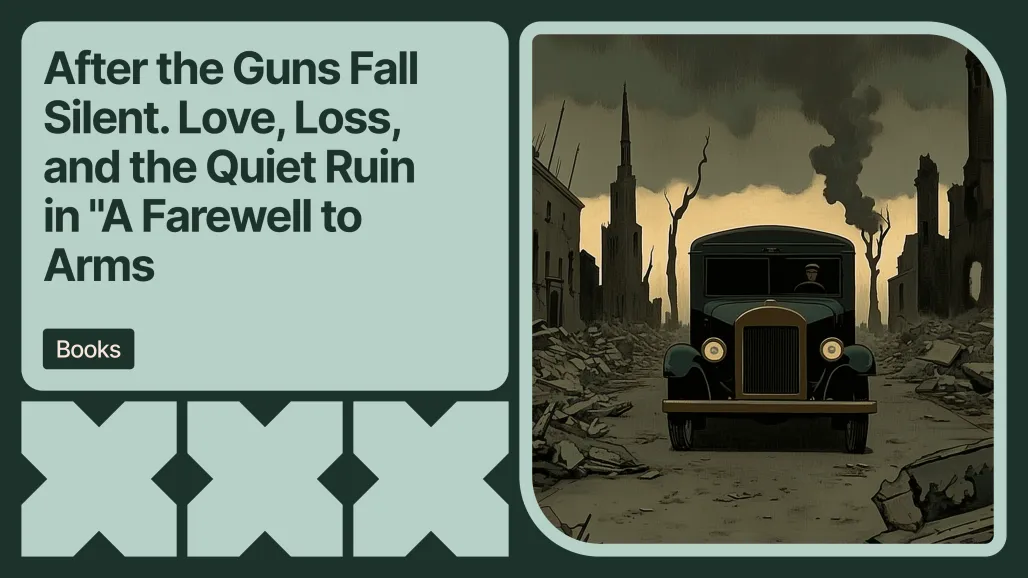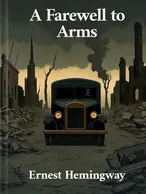After the Guns Fall Silent. Love, Loss, and the Quiet Ruin in "A Farewell to Arms"

Explore Hemingway’s A Farewell to Arms—a haunting story of love, war, and what’s left when meaning, hope, and heroism fall away.
1. Is Love Enough During War?
2. War Isn’t Glorious—It’s Confusing and Empty
3. The Quiet Pain That Doesn’t Go Away
Conclusion: Saying Goodbye to Meaning
Ernest Hemingway’s A Farewell to Arms is more than just a war story. It’s about what happens to people after war—what they carry with them, what they lose, and how they try to keep going when life feels broken.
Set during World War I, the novel follows an American man named Frederic Henry, who drives an ambulance for the Italian army. He falls in love with Catherine Barkley, a British nurse. But around them, the world is falling apart. This story shows how war can affect love, beliefs, and a person’s sense of who they are.
1. Is Love Enough During War?
At first, Frederic and Catherine’s relationship seems like a safe space from the chaos around them. They fall in love quickly, and their time together feels peaceful. But over time, we see that their love is built on trying to forget the pain outside—not always on deep understanding.

Catherine has already lost someone in the war. She clings to Frederic, not just out of love, but because he becomes her world. Frederic, too, loves Catherine, but we wonder—is he in love with her or with the escape she gives him?

They try to escape war and find peace together. But can love survive when the world around you is falling apart?
Ask yourself:
- Is their love strong, or is it just a way to avoid facing reality?
- Can love heal you when everything else is breaking down?
2. War Isn’t Glorious—It’s Confusing and Empty
Hemingway doesn’t write about war as something heroic or exciting. In this book, war is messy, full of confusion and fear. There are no great victories, just people trying to survive.

Frederic gets hurt—not only on the outside, but on the inside. He starts to see that war doesn’t make sense. People are punished unfairly, and everything feels out of control.

Hemingway’s writing is simple and direct. He doesn’t add emotion or drama—he lets the facts speak for themselves. That makes the pain feel more real. War doesn’t make Frederic stronger—it makes him question everything.
Ask yourself:
- Can war ever be noble, or is it always about loss?
- What do people really fight for?
3. The Quiet Pain That Doesn’t Go Away
Frederic is a typical Hemingway character: quiet, strong, and calm on the outside, even when he’s hurting deeply. He doesn’t cry or talk about his pain—he just keeps going. But that doesn’t mean he isn’t suffering.

This quote shows how Hemingway saw the world: life hurts everyone. Some people survive it and learn to live with the pain. Others don’t. Frederic tries to keep going, but the more he loses, the emptier he becomes.

He doesn’t say much, but we can feel his sadness. The more he experiences, the less he believes in anything—love, war, or even hope. This is the cost of survival.
Ask yourself:
- What happens when you survive something terrible but don’t know what to believe in anymore?
- Is being strong the same as being okay?
Conclusion: Saying Goodbye to Meaning
A Farewell to Arms isn’t about winning or losing a war. It’s about what happens after the fight is over. It’s about a man who tries to find love, peace, and purpose—and who slowly realizes that these things don’t always survive war.

In the end, Frederic walks alone. Hemingway doesn’t give us answers. He just shows us a man who’s trying to keep living, even when everything he believed in is gone.
If you want to understand Frederic’s full story—and why this novel still speaks to so many people today—read it on WholeReader. There, you’ll find not only the full text but also narration that brings Hemingway’s minimalist prose and unspoken grief to life.
📘 This story doesn’t tell you what to think. It asks you to feel what’s left behind.
